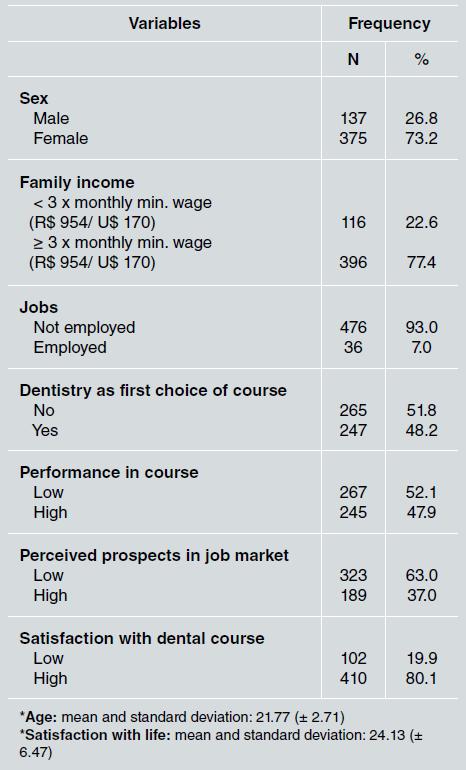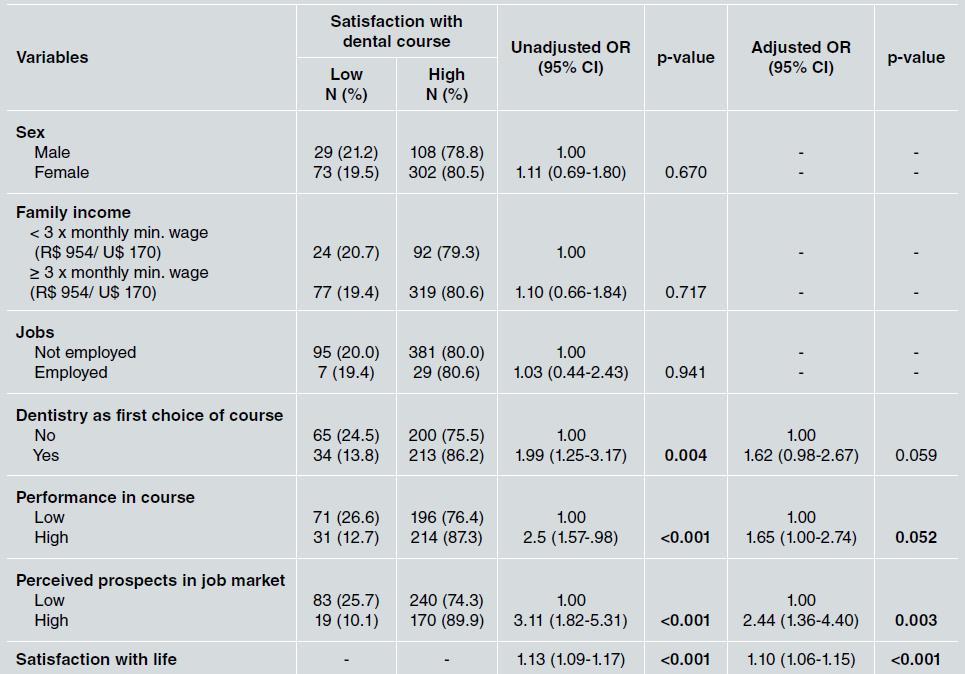INTRODUCTION
Emotional and social aspects are vital to the development and maintenance of interpersonal relations, including those between healthcare providers and patients 1 . The emotional reactions of university students are reflected by their academic satisfaction 2 . Students’ satisfaction with their undergraduate course may involve factors such as academic performance 4, 5 , motivation in the choice of course 4 and job prospects 6 . Dissatisfaction can affect their university life and learning processes, and compromise their professional future, work environment and relationships with other healthcare providers. Even so, psychometric tests are rarely administered in health courses at universities 3 .
The literature reports associations between dental students’ satisfaction with their undergraduate course, sociodemographic characteristics 5, 7 , and satisfaction with life 8, 9 , though there are few studies on the subject 4,6, 7 .
Knowledge of factors that influence degree of satisfaction among undergraduate dental students can contribute to establishing strategies for improving the educational process, furthering student development, and enhancing academic and professional achievements. Dental teaching institutions could use such knowledge to take specific actions to improve their academic role.
The aim of this study was thus to investígate associations between undergraduate dental students’ satisfaction with their course and its association with their demographic characteristics, satisfaction with life, and other professional factors, in a representative sample from a public university in Brazil.
MATERIALS AND METHOD
Ethical aspects
This study was approved by the Human Research Ethics Committee of Universidade Federal de Minas Gerais (UFMG), Brazil (protocol number: 67189617.2.1001.5149). All volunteers received explanations regarding the objectives of the study and agreed to participate by signing a statement of informed consent.
Study design and sample characteristics
This was a cross-sectional study on dental students from the School of Dentistry of the UFMG, which is the fifth largest university in Latin America and the third largest higher education institution in Brazil, according to Times Higher Education ranking published in July 2021 10 .
The inclusion criterion was being an undergraduate student enrolled in the UFMG dental course. The universe population comprised 641 undergraduate dental students, of whom 512 took part in the study (response rate: 80.37%), as 129 were not present at the time of data collection.
Data collection
A pilot study was first conducted with ten students to assess the logistics of administering the questionnaire and participant adherence. The results of the pilot study did not show any need for changes in the proposed study method.
Data were collected in the second semester of 2018. Self-administered structured questionnaires were used, addressing sociodemographic characteristics, the dental course, professional career, and satisfaction with life. Sociodemographic variables were age, sex, and income. Income was dichotomized as < three times or > three times the Brazilian monthly minimum wage (R$ 954/USS 170). Questions on the course and professional career enquired about whether students had jobs while they were in the undergraduate course, and their degree of satisfaction with the course, course choice process, academic performance, and perceptions regarding the job market. The Satisfaction with Life Scale (SWLS) was used, which consists of five statements scored on a seven-point Likert scale with response options ranging from “I strongly disagree” (1 point) to “I strongly agree” (7 points). Higher scores indicate greater satisfaction with life. Cronbach’s alpha coefficient for the present sample was a = 0.82 11 .
Data analysis
The Statistical Package for the Social Sciences (SPSS for Windows, version 21.0, IBM Inc., Armonk, NY, USA) was used for data organization and statistical analysis. Data frequency distribution was determined for sample characterization. Logistic regression analysis was performed to test associations between the dependent variable satisfaction with the dental course and the independent variables. The unadjusted backward stepwise procedure was used for selecting variables with a p-value <0.20 to be used in the adjusted analyses.
RESULTS
Table 1 shows participants’ characteristics. Most participants were female (73.2%) and single (99.8%). Monthly family income was higher than US$ 1,755.82 among 77.4% of the sample. Mean age was 21.77 ± 2.71 years and most students expressed high satisfaction with the course (80.1%). For 51.8%, dentistry was not their first course of choice. Among these, medicine had been the first educational and professional choice for 72.5%. Regarding satisfaction with life, the mean SWLS score was 24.13 ± 6.47 points (range: 5 to 35 points). Table 2 shows the results of the logistic regression analysis conducted to determine factors associated with the outcome. The multivariate analysis revealed that satisfaction with the course was associated with perception of the job market (OR = 2.44; 95% CI: 1.36-4.40), academic performance (OR = 1.65; 95% CI: 1.00-2.74) and satisfaction with life (OR = 1.10; 95% CI: 1.06-1.15).
DISCUSSION
Personal, academic, professional, and sociodemographic factors may be related to satisfaction with the course 4-9 . In the present study, satisfaction with the course was related to perception of the job market, academic performance and satisfaction with life, but not to sociodemographic variables. The association between perception of the job market and satisfaction with the dental course is related to optimistic outlooks. Optimistic students express considerable interest in their professional future, are enthusiastic about the field of learning, feel confident about succeeding in their careers, and express high levels of satisfaction with the course 7 . Self-efficacy is associated with higher likelihood of students persevering to complete their studies and having greater confidence regarding success in the world of work. Programs that promote self-esteem and confidence among dental students regarding a professional future should therefore be encouraged 12, 13 . Students’ self-efficacy can be fostered by providing training to improve self-awareness for increasing knowledge and skills related to the profession. The literature reports that enhanced self-efficacy generates self-determined motivation and greater satisfaction with the course. Academic institutions can help motivate students regarding their professional future by promoting satisfaction with the course and life itself 13 .
The study also found an association between academic performance and satisfaction with the course. Highly motivated dental students tend to have better learning characteristics 14 . Educational motivation involves engagement for pleasure and satisfaction 5 , and satisfied students tend to be motivated, resulting in a good academic performance. Studies on students of medicine and psychology in Korea and Australia also found an association between satisfaction and academic performance 15, 16 . However, a study on undergraduate students of social work in Germany found no association between satisfaction and academic performance 17 . Satisfaction with the course may be related differently to academic performance in different professional fields such as health and human sciences.
Satisfaction with life was also associated with satisfaction with the dental course. Satisfaction with life is not the mere sum of satisfaction in different dimensions of life, but rather, a stable psychological characteristic that influences the perceptions and reactions of individuáis in their environment 9,18, 19 . The concepts of happiness and satisfaction with life are similar, and their assessment is subjective, depending on self-perception, mood and lifestyle 20 . Despite cultural differences, other studies on students in Hong Kong and Mexico found the same association as the current study, with people who were more satisfied with life reporting greater satisfaction with the course 9, 21 .
Students in Brazil are admitted to public universities based on their grades in a national admission examination which evaluates the knowledge acquired at high school. Twice a year, an online system is opened to rank the exam grades, after which students can apply for up to two courses anywhere in the country. The higher the grade, the greater the possibility of being admitted 22 . Admission to some undergraduate courses such as medicine can be difficult as a result of the high level of competition among candidates 23 . Students who are not admitted to the medical course often choose dentistry as a second option. This might cause frustration, as dentistry may not have been chosen based on vocation 24 . In the present study, half the students reported that dentistry was not their course of choice. However, this finding was not related to satisfaction with the course, possibly because medicine and dentistry are both in the health field and share subjects and methods, or because students who did not identify with dentistry dropped out of the course in the initial semesters.
None of the sociodemographic factors studied (age, sex or having a job) influence students’ satisfaction with the course. However, previous studies using the Academic Motivation Scale found that women had greater self-determination than men and greater motivation regarding the dental course 5, 25 . A study conducted with computer science students at a public university in Spain found that women tended to express greater satisfaction with the course than men 8 . Sociodemographic indicators should be explored in future studies to enable a more in-depth understanding of these divergent results.
The present study has strengths and limitations. The high response rate ensured good representativeness of the target population. However, the cross-sectional design does not enable the establishment of cause-and-effect relationships. Longitudinal studies are needed to identify causality among the study variables and contribute more information upon which to base intervention measures.
Teaching institutions should develop programs to foster students’ self-awareness, empowerment, and mental and emotional healthcare. Curricular opportunities should be created to promote undergraduate dental students’ self-reflection and self-efficacy, and help improve their attitude towards the job market by pointing out both challenges and potential victories. This would help keep students motivated, optimistic and satisfied with life.

















